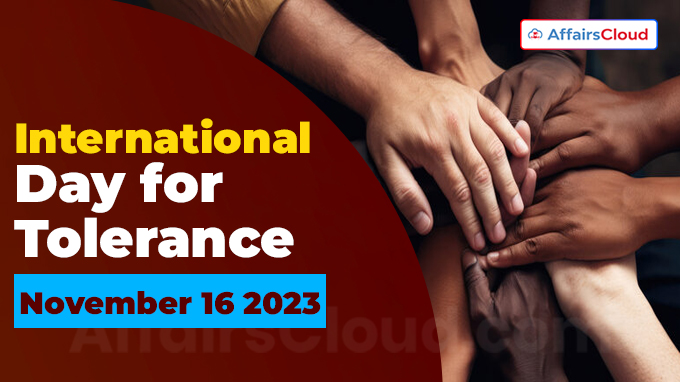 The United Nations (UN) International Day for Tolerance is annually observed across the globe on 16 November to promote and raise awareness of tolerance, respect, and understanding among all the diverse cultures and communities across the globe.
The United Nations (UN) International Day for Tolerance is annually observed across the globe on 16 November to promote and raise awareness of tolerance, respect, and understanding among all the diverse cultures and communities across the globe.
- The day also highlights the negative effects of intolerance and promotes policies that ensure equal rights and opportunities for all.
Background:
i.In 1996, the United Nations General Assembly (UNGA) adopted the resolution A/RES/51/95 and proclaimed the 16 November of every year as the International Day for Tolerance.
ii.The first International Day for Tolerance was observed on 16 November 1997.
UN Year of Tolerance – 1995: In 1993, the UNGA adopted the resolution A/RES/48/126, and proclaimed the year 1995 as the UN year for tolerance.
Why November 16?
The day commemorates adoption of the Declaration of Principles on Tolerance by the member states of the United Nations Educational, Scientific and Cultural Organization (UNESCO) on November 16, 1995.
Tolerance:
Tolerance is neither indulgence nor indifference, it is respect, acceptance, and appreciation of the rich diversity of our world’s cultures, forms of expression, and ways of being human.
UNESCO’s Efforts to Promote Tolerance:
UNESCO’s efforts to promote a Culture of Peace and Non-violence; Democracy and Global Citizenship; Fostering Rights, Inclusion, and Non-Discrimination; Education transforms lives; Freedom of Expression, and the Rule of Law play a major role in promoting tolerance.
UNESCO-Madanjeet Singh Prize:
i.The UNESCO-Madanjeet Singh Prize for the Promotion of Tolerance and Non-Violence rewards significant activities in the scientific, artistic, cultural, and communication fields aimed at the promotion of a spirit of tolerance and non-violence.
ii.The Prize was established in 1995 by the UNESCO executive board on the occasion of the UN Year for Tolerance and the 125th anniversary of the birth of Mahatma Gandhi.
iii.The prize is awarded every 2 years, on the occasion of the International Day for Tolerance (16 November).
iv.The Prize includes a cash prize of USD 100,000.
About Madanjeet Singh:
i.He was born on 16 April 1924 in Lahore (now Pakistan), British India and is an internationally known author of several books on art and other subjects.
- He served as Ambassador of India in Asia, South America, Africa, and Europe.
ii.In 2000, he created the South Asia Foundation (SAF) to promote sustainable cultural, educational, and economic development throughout the region.
iii.He was designated as a UNESCO Goodwill Ambassador on 16 November 2000.
Laureate from India:
In 1998, M. Narayan Desai, an Indian anti-nuclear activist, and promoter of religious and ethnic understanding and tolerance was awarded the UNESCO-Madanjeet Singh Prize for the Promotion of Tolerance and Non-Violence.
- The prize was also shared by a Joint Action Committee for People’s Rights of Pakistan.




